形容词比较级和最高级的正确使用 教案
- 格式:doc
- 大小:565.56 KB
- 文档页数:9
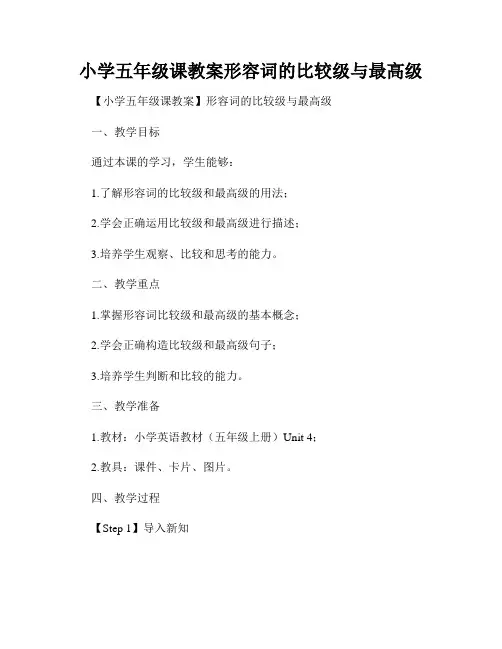
小学五年级课教案形容词的比较级与最高级【小学五年级课教案】形容词的比较级与最高级一、教学目标通过本课的学习,学生能够:1.了解形容词的比较级和最高级的用法;2.学会正确运用比较级和最高级进行描述;3.培养学生观察、比较和思考的能力。
二、教学重点1.掌握形容词比较级和最高级的基本概念;2.学会正确构造比较级和最高级句子;3.培养学生判断和比较的能力。
三、教学准备1.教材:小学英语教材(五年级上册)Unit 4;2.教具:课件、卡片、图片。
四、教学过程【Step 1】导入新知1. 教师示范比较级的用法。
教师出示两张图片,并使用适当的形容词进行比较,如:"This cat is big. But this cat is bigger."(出示一只小猫和一只大猫的图片)2. 让学生思考:为什么我们会用形容词的比较级来描述这两只猫的大小呢?通过引导,学生能理解形容词的比较级是用来比较两个事物的。
【Step 2】探究形容词的比较级1. 给学生出示一些单音节形容词,并请他们一起想出它们的比较级形式。
如:big – bigger; small – smaller; tall – taller等。
2. 让学生观察变化规律,总结如下:- 一般在形容词后面直接加-er;- 以字母e结尾的形容词,删除e,再加-er;- 以辅音字母+y结尾的形容词,变y为i,再加-er。
【Step 3】练习形容词的比较级1. 让学生进行小组活动,利用所学的形容词比较级描述不同事物的特征。
2. 学生进行展示并互相评价,鼓励他们用完整的句子进行表达。
【Step 4】引入最高级1. 通过对比形容词的比较级和最高级的示范,引出最高级的概念。
比较级:This cat is bigger.(指出其中较大的一只猫)最高级:This cat is the biggest.(指出所有猫中最大的一只)【Step 5】探究形容词的最高级1. 给学生出示一些单音节形容词,并让他们一起想出它们的最高级形式。
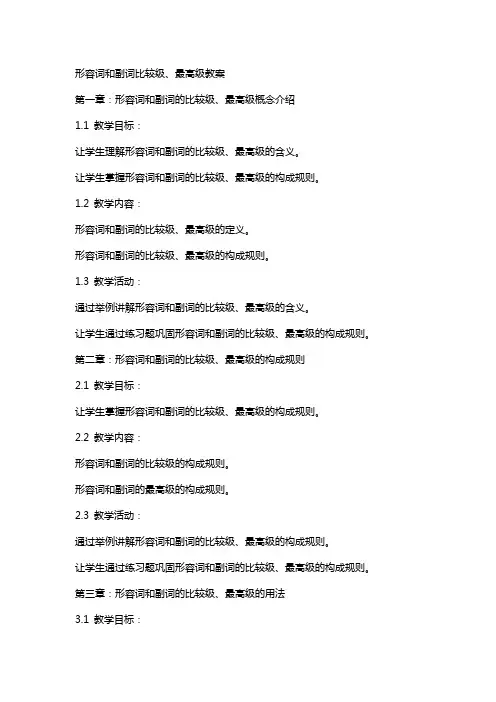
形容词和副词比较级、最高级教案第一章:形容词和副词的比较级、最高级概念介绍1.1 教学目标:让学生理解形容词和副词的比较级、最高级的含义。
让学生掌握形容词和副词的比较级、最高级的构成规则。
1.2 教学内容:形容词和副词的比较级、最高级的定义。
形容词和副词的比较级、最高级的构成规则。
1.3 教学活动:通过举例讲解形容词和副词的比较级、最高级的含义。
让学生通过练习题巩固形容词和副词的比较级、最高级的构成规则。
第二章:形容词和副词的比较级、最高级的构成规则2.1 教学目标:让学生掌握形容词和副词的比较级、最高级的构成规则。
2.2 教学内容:形容词和副词的比较级的构成规则。
形容词和副词的最高级的构成规则。
2.3 教学活动:通过举例讲解形容词和副词的比较级、最高级的构成规则。
让学生通过练习题巩固形容词和副词的比较级、最高级的构成规则。
第三章:形容词和副词的比较级、最高级的用法3.1 教学目标:让学生理解形容词和副词的比较级、最高级的用法。
3.2 教学内容:形容词和副词的比较级、最高级的用法。
3.3 教学活动:通过举例讲解形容词和副词的比较级、最高级的用法。
让学生通过练习题巩固形容词和副词的比较级、最高级的用法。
第四章:形容词和副词的比较级、最高级的练习4.1 教学目标:让学生通过练习巩固形容词和副词的比较级、最高级的知识和用法。
4.2 教学内容:形容词和副词的比较级、最高级的练习题。
4.3 教学活动:让学生独立完成练习题。
老师对学生的练习进行讲解和指导。
第五章:形容词和副词的比较级、最高级的应用5.1 教学目标:让学生能够在实际语境中运用形容词和副词的比较级、最高级。
5.2 教学内容:形容词和副词的比较级、最高级的实际应用场景。
5.3 教学活动:通过举例讲解形容词和副词的比较级、最高级的实际应用场景。
让学生通过练习题巩固形容词和副词的比较级、最高级的实际应用能力。
第六章:形容词和副词比较级、最高级的句型结构6.1 教学目标:让学生掌握形容词和副词比较级、最高级的句型结构。
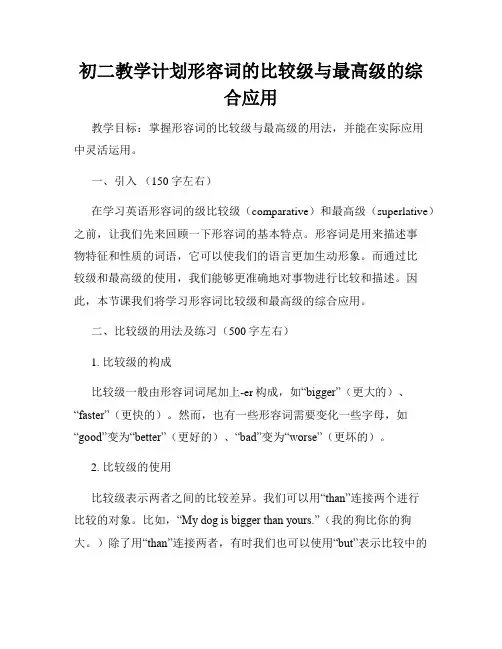
初二教学计划形容词的比较级与最高级的综合应用教学目标:掌握形容词的比较级与最高级的用法,并能在实际应用中灵活运用。
一、引入(150字左右)在学习英语形容词的级比较级(comparative)和最高级(superlative)之前,让我们先来回顾一下形容词的基本特点。
形容词是用来描述事物特征和性质的词语,它可以使我们的语言更加生动形象。
而通过比较级和最高级的使用,我们能够更准确地对事物进行比较和描述。
因此,本节课我们将学习形容词比较级和最高级的综合应用。
二、比较级的用法及练习(500字左右)1. 比较级的构成比较级一般由形容词词尾加上-er构成,如“bigger”(更大的)、“faster”(更快的)。
然而,也有一些形容词需要变化一些字母,如“good”变为“better”(更好的)、“bad”变为“worse”(更坏的)。
2. 比较级的使用比较级表示两者之间的比较差异。
我们可以用“than”连接两个进行比较的对象。
比如,“My dog is bigger than yours.”(我的狗比你的狗大。
)除了用“than”连接两者,有时我们也可以使用“but”表示比较中的例外情况,“She is happy, but I am happier.”(她很高兴,但是我更高兴。
)练习题:根据括号内的提示,完成下列句子。
1. This book is ______ (interesting) than that one.2. My house is ______ (big) than yours.3. English is ______ (difficult) than Chinese.4. Tom is ______ (tall) boy in our class.5. Cats are ______ (clever) than dogs.三、最高级的用法及练习(500字左右)1. 最高级的构成最高级一般在形容词前加上“the”,然后在形容词后面加上“-est”,如“the biggest”(最大的)、“the fastest”(最快的)。
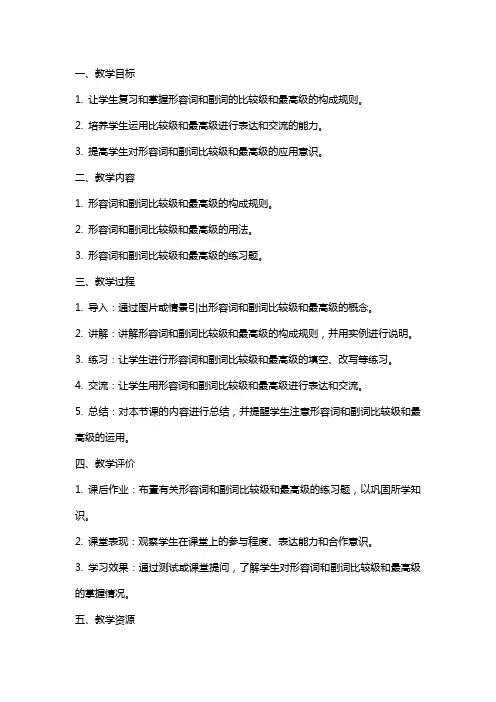
一、教学目标1. 让学生复习和掌握形容词和副词的比较级和最高级的构成规则。
2. 培养学生运用比较级和最高级进行表达和交流的能力。
3. 提高学生对形容词和副词比较级和最高级的应用意识。
二、教学内容1. 形容词和副词比较级和最高级的构成规则。
2. 形容词和副词比较级和最高级的用法。
3. 形容词和副词比较级和最高级的练习题。
三、教学过程1. 导入:通过图片或情景引出形容词和副词比较级和最高级的概念。
2. 讲解:讲解形容词和副词比较级和最高级的构成规则,并用实例进行说明。
3. 练习:让学生进行形容词和副词比较级和最高级的填空、改写等练习。
4. 交流:让学生用形容词和副词比较级和最高级进行表达和交流。
5. 总结:对本节课的内容进行总结,并提醒学生注意形容词和副词比较级和最高级的运用。
四、教学评价1. 课后作业:布置有关形容词和副词比较级和最高级的练习题,以巩固所学知识。
2. 课堂表现:观察学生在课堂上的参与程度、表达能力和合作意识。
3. 学习效果:通过测试或课堂提问,了解学生对形容词和副词比较级和最高级的掌握情况。
五、教学资源1. 图片或情景:用于导入和激发学生兴趣。
2. 练习题:用于巩固所学知识,提高学生的应用能力。
3. 教学PPT:用于展示和讲解形容词和副词比较级和最高级的知识。
4. 参考资料:为学生提供更多的学习资源和拓展知识。
六、教学策略1. 任务型教学法:通过设计各种任务,让学生在实践中运用形容词和副词比较级和最高级。
2. 合作学习:鼓励学生分组讨论和完成练习,培养学生的团队合作能力。
3. 交际式教学法:通过角色扮演、小组讨论等形式,提高学生的口语表达能力和交际能力。
4. 直观教学法:利用图片、实物等直观教具,帮助学生更好地理解和记忆形容词和副词比较级和最高级。
七、教学重点与难点1. 教学重点:形容词和副词比较级和最高级的构成规则、用法和练习。
2. 教学难点:形容词和副词比较级和最高级的运用,特别是在实际语境中的运用。
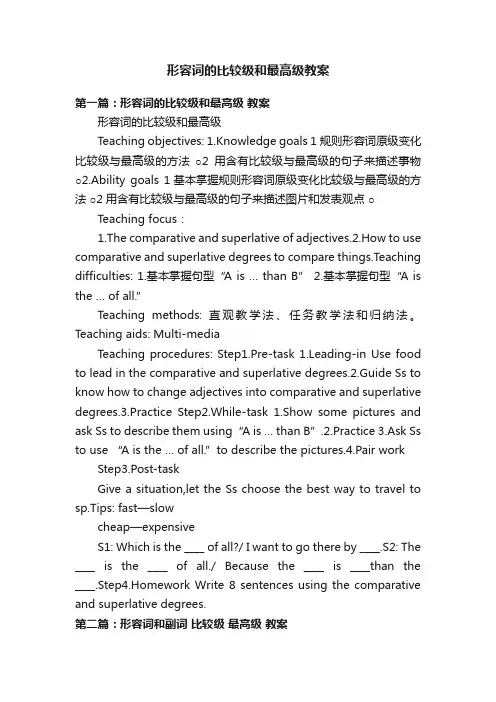
形容词的比较级和最高级教案第一篇:形容词的比较级和最高级教案形容词的比较级和最高级Teaching objectives: 1.Knowledge goals 1规则形容词原级变化比较级与最高级的方法○2用含有比较级与最高级的句子来描述事物○2.Ability goals 1基本掌握规则形容词原级变化比较级与最高级的方法○2用含有比较级与最高级的句子来描述图片和发表观点○Teaching focus:1.The comparative and superlative of adjectives.2.How to use comparative and superlative degrees to compare things.Teaching difficulties: 1.基本掌握句型“A is … than B” 2.基本掌握句型“A is the … of all.”Teaching methods: 直观教学法、任务教学法和归纳法。
Teaching aids: Multi-mediaTeaching procedures: Step1.Pre-task 1.Leading-in Use food to lead in the comparative and superlative degrees.2.Guide Ss to know how to change adjectives into comparative and superlative degrees.3.Practice Step2.While-task 1.Show some pictures and ask Ss to describe them using“A is … than B”.2.Practice 3.Ask Ss to use “A is the … of all.”to describe the pictures.4.Pair work Step3.Post-taskGive a situation,let the Ss choose the best way to travel to sp.Tips: fast—slowcheap—expensiveS1: Which is the ____ of all?/ I want to go there by ____.S2: The ____ is the ____ of all./ Because the ____ is ____than the ____.Step4.Homework Write 8 sentences using the comparative and superlative degrees.第二篇:形容词和副词比较级最高级教案形容词、副词的比较级和最高级的用法:当两种物体之间相互比较时,我们要用形容词或副词的比较级;当相互比较的物体是三个或三个以上时,我们就要用形容词或副词的最高级。
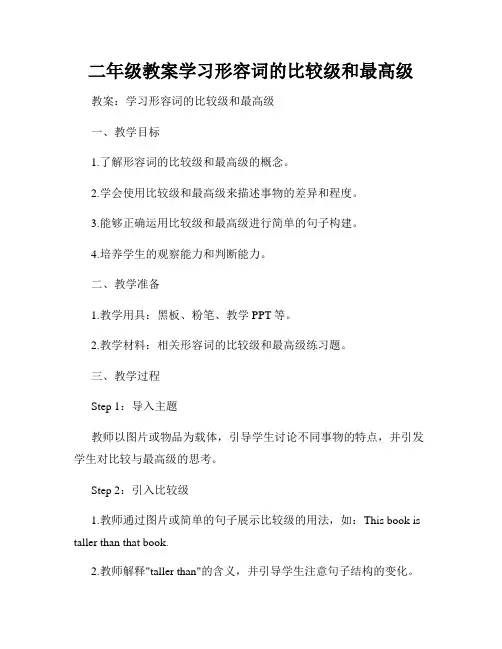
二年级教案学习形容词的比较级和最高级教案:学习形容词的比较级和最高级一、教学目标1.了解形容词的比较级和最高级的概念。
2.学会使用比较级和最高级来描述事物的差异和程度。
3.能够正确运用比较级和最高级进行简单的句子构建。
4.培养学生的观察能力和判断能力。
二、教学准备1.教学用具:黑板、粉笔、教学PPT等。
2.教学材料:相关形容词的比较级和最高级练习题。
三、教学过程Step 1:导入主题教师以图片或物品为载体,引导学生讨论不同事物的特点,并引发学生对比较与最高级的思考。
Step 2:引入比较级1.教师通过图片或简单的句子展示比较级的用法,如:This book is taller than that book.2.教师解释"taller than"的含义,并引导学生注意句子结构的变化。
3.教师设计小组活动,要求学生结合实际情况使用比较级进行简单对比,互相交流并展示自己的发现。
Step 3:引入最高级1.教师以同一类事物的多个实例来引入最高级的概念,如:Which animal is the fastest in the world?2.教师引导学生理解并使用最高级进行描述,如:The cheetah is the fastest animal in the world.3.教师设计小组活动,要求学生在小组内就某一特定事物找出最高级,并展示自己的结果。
Step 4:巩固与拓展1.教师提供一些比较级和最高级的练习题,要求学生在课堂上完成并进行讨论。
2.教师鼓励学生尝试创造性地运用比较级和最高级进行句子构建,展示自己的表达能力。
3.教师搜集相关图片或视频素材,让学生自由发挥,以比较级和最高级为依据进行口头描述。
四、教学总结与展望通过本节课的学习,学生们对形容词的比较级和最高级有了一定的了解,并能够在实际运用时运用自如。
在今后的学习中,我们将进一步拓展形容词的用法,丰富语言表达。
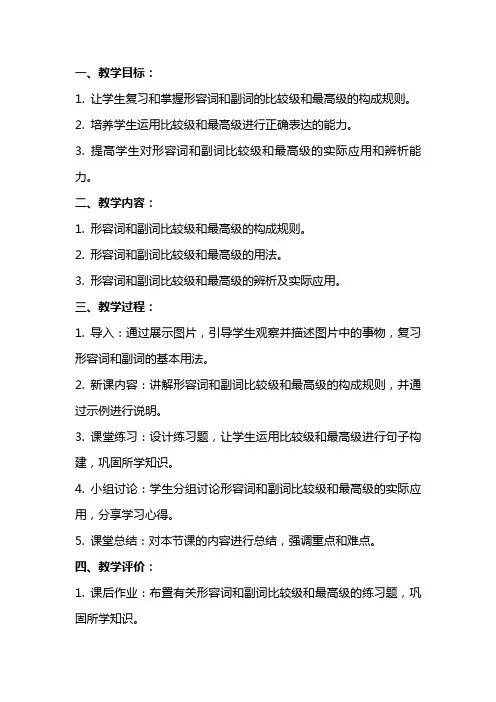
一、教学目标:1. 让学生复习和掌握形容词和副词的比较级和最高级的构成规则。
2. 培养学生运用比较级和最高级进行正确表达的能力。
3. 提高学生对形容词和副词比较级和最高级的实际应用和辨析能力。
二、教学内容:1. 形容词和副词比较级和最高级的构成规则。
2. 形容词和副词比较级和最高级的用法。
3. 形容词和副词比较级和最高级的辨析及实际应用。
三、教学过程:1. 导入:通过展示图片,引导学生观察并描述图片中的事物,复习形容词和副词的基本用法。
2. 新课内容:讲解形容词和副词比较级和最高级的构成规则,并通过示例进行说明。
3. 课堂练习:设计练习题,让学生运用比较级和最高级进行句子构建,巩固所学知识。
4. 小组讨论:学生分组讨论形容词和副词比较级和最高级的实际应用,分享学习心得。
5. 课堂总结:对本节课的内容进行总结,强调重点和难点。
四、教学评价:1. 课后作业:布置有关形容词和副词比较级和最高级的练习题,巩固所学知识。
2. 课堂表现:观察学生在课堂上的参与程度、回答问题的情况,了解学生的学习效果。
3. 小组讨论:评估学生在小组讨论中的表现,包括表达能力、合作精神等。
五、教学资源:1. 教学PPT:展示形容词和副词比较级和最高级的构成规则、用法和练习题。
2. 图片:用于导入课堂,激发学生兴趣。
3. 练习题:设计有关形容词和副词比较级和最高级的练习题,巩固所学知识。
4. 小组讨论:组织学生进行小组讨论,促进互动和合作学习。
六、教学策略:1. 案例分析:通过具体案例分析,让学生深入了解形容词和副词比较级和最高级的应用场景。
2. 互动教学:采用提问、回答、讨论等方式,激发学生的思考,提高课堂互动性。
3. 任务型教学:设计任务让学生完成,培养学生实际运用比较级和最高级进行表达的能力。
七、教学步骤:1. 复习形容词和副词的基本用法,通过展示图片引导学生描述图片中的事物。
2. 讲解比较级和最高级的构成规则,并通过示例进行说明。
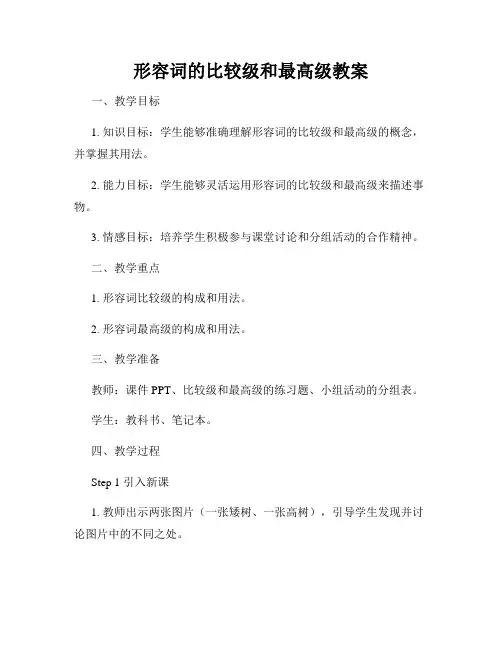
形容词的比较级和最高级教案一、教学目标1. 知识目标:学生能够准确理解形容词的比较级和最高级的概念,并掌握其用法。
2. 能力目标:学生能够灵活运用形容词的比较级和最高级来描述事物。
3. 情感目标:培养学生积极参与课堂讨论和分组活动的合作精神。
二、教学重点1. 形容词比较级的构成和用法。
2. 形容词最高级的构成和用法。
三、教学准备教师:课件PPT、比较级和最高级的练习题、小组活动的分组表。
学生:教科书、笔记本。
四、教学过程Step 1 引入新课1. 教师出示两张图片(一张矮树、一张高树),引导学生发现并讨论图片中的不同之处。
2. 引导学生尝试用形容词来描述图片中的两棵树,并引出形容词的比较级概念,并举例说明。
Step 2 形容词的比较级1. 给出形容词比较级的构成规则,并通过多个例句进行讲解。
比较级的构成规则:在形容词后加上-er(如taller)或在其前面加上more(如more interesting)。
例:The tree is taller than the house.(这棵树比房子高。
)This book is more interesting than that one.(这本书比那本书更有趣。
)2. 让学生进行比较级的练习,确保学生掌握比较级的用法。
Step 3 形容词的最高级1. 给出形容词最高级的构成规则,并通过多个例句进行讲解。
最高级的构成规则:在形容词后加上-est(如tallest)或在其前面加上the most(如the most interesting)。
例:The tree is the tallest in the neighborhood.(这棵树是整个社区最高的。
)This is the most interesting book I've ever read.(这是我读过的最有趣的书。
)2. 让学生进行最高级的练习,巩固最高级的用法。
Step 4 小组活动1. 将学生分成小组,每个小组选择一个话题(如动物、食物等)。
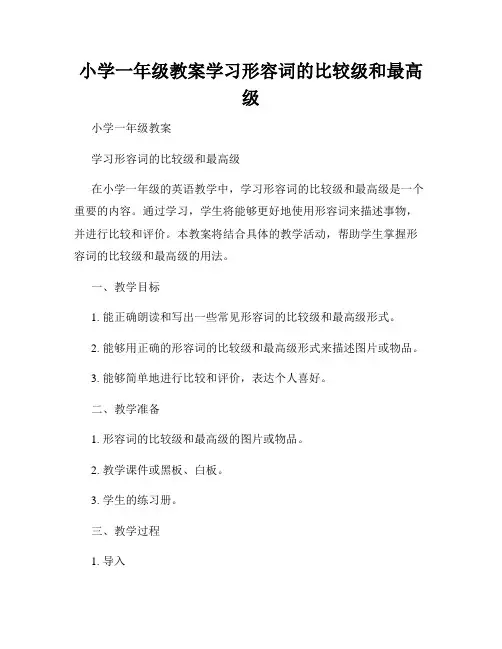
小学一年级教案学习形容词的比较级和最高级小学一年级教案学习形容词的比较级和最高级在小学一年级的英语教学中,学习形容词的比较级和最高级是一个重要的内容。
通过学习,学生将能够更好地使用形容词来描述事物,并进行比较和评价。
本教案将结合具体的教学活动,帮助学生掌握形容词的比较级和最高级的用法。
一、教学目标1. 能正确朗读和写出一些常见形容词的比较级和最高级形式。
2. 能够用正确的形容词的比较级和最高级形式来描述图片或物品。
3. 能够简单地进行比较和评价,表达个人喜好。
二、教学准备1. 形容词的比较级和最高级的图片或物品。
2. 教学课件或黑板、白板。
3. 学生的练习册。
三、教学过程1. 导入教师可以从一个比较简单的例子开始,例如先出示一张小猫的图片,然后问: "What do you see in the picture?" 学生回答后,再问: "Canyou find any words to describe the cat?" 学生可以尝试用简单的形容词来描述小猫的外貌特征,如"small"、"cute"等。
2. 讲解接下来,教师可以用形象的图片或物品向学生展示形容词的比较级和最高级形式,例如:用三座不同高度的山来表达"高"、"更高"和"最高"。
通过对比学生可以更好地理解。
教师可以用黑板或白板来列出一些常用的形容词的比较级和最高级形式,例如:- small – smaller – smallest- tall – taller – tallest- big – bigger – biggest- happy – happier – happiest- sad – sadder – saddest3. 操练教师可以让学生做一些形容词比较级和最高级的练习,例如:- 用适当的形容词形式来填空或进行句子改写。
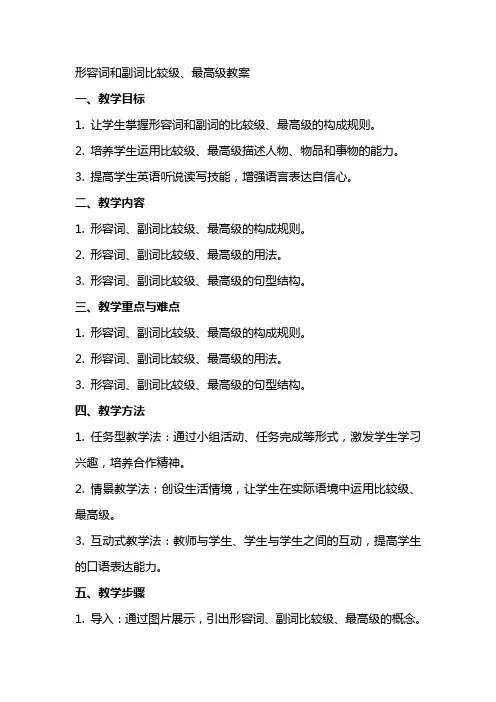
形容词和副词比较级、最高级教案一、教学目标1. 让学生掌握形容词和副词的比较级、最高级的构成规则。
2. 培养学生运用比较级、最高级描述人物、物品和事物的能力。
3. 提高学生英语听说读写技能,增强语言表达自信心。
二、教学内容1. 形容词、副词比较级、最高级的构成规则。
2. 形容词、副词比较级、最高级的用法。
3. 形容词、副词比较级、最高级的句型结构。
三、教学重点与难点1. 形容词、副词比较级、最高级的构成规则。
2. 形容词、副词比较级、最高级的用法。
3. 形容词、副词比较级、最高级的句型结构。
四、教学方法1. 任务型教学法:通过小组活动、任务完成等形式,激发学生学习兴趣,培养合作精神。
2. 情景教学法:创设生活情境,让学生在实际语境中运用比较级、最高级。
3. 互动式教学法:教师与学生、学生与学生之间的互动,提高学生的口语表达能力。
五、教学步骤1. 导入:通过图片展示,引出形容词、副词比较级、最高级的概念。
2. 讲解:讲解形容词、副词比较级、最高级的构成规则及用法。
3. 练习:进行分组练习,让学生在实际语境中运用比较级、最高级。
4. 拓展:引导学生运用比较级、最高级描述人物、物品和事物。
5. 总结:对本节课内容进行总结,强调比较级、最高级的重要性和运用。
教学评价:通过课堂表现、练习完成情况和课后作业,评估学生对形容词、副词比较级、最高级的掌握程度。
六、教学活动设计1. 小组竞赛:划分学生为若干小组,进行形容词和副词比较级、最高级的抢答竞赛。
2. 角色扮演:设计情境,让学生运用比较级、最高级进行角色扮演。
3. 写作练习:布置一篇以比较级、最高级描述人物的短文写作任务。
七、教学案例案例一:比较级、最高级在人物描述中的应用案例二:比较级、最高级在物品比较中的应用案例三:比较级、最高级在事物评价中的应用八、课后作业1. 完成练习册上的相关练习题。
2. 搜集生活中的形容词、副词比较级、最高级的例子,进行分享。
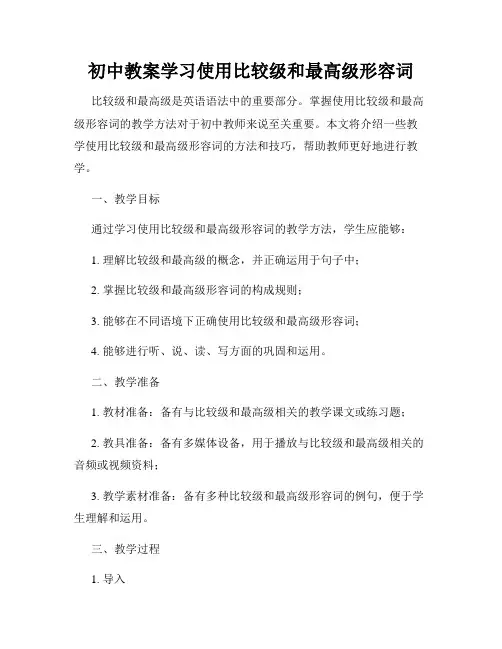
初中教案学习使用比较级和最高级形容词比较级和最高级是英语语法中的重要部分。
掌握使用比较级和最高级形容词的教学方法对于初中教师来说至关重要。
本文将介绍一些教学使用比较级和最高级形容词的方法和技巧,帮助教师更好地进行教学。
一、教学目标通过学习使用比较级和最高级形容词的教学方法,学生应能够:1. 理解比较级和最高级的概念,并正确运用于句子中;2. 掌握比较级和最高级形容词的构成规则;3. 能够在不同语境下正确使用比较级和最高级形容词;4. 能够进行听、说、读、写方面的巩固和运用。
二、教学准备1. 教材准备:备有与比较级和最高级相关的教学课文或练习题;2. 教具准备:备有多媒体设备,用于播放与比较级和最高级相关的音频或视频资料;3. 教学素材准备:备有多种比较级和最高级形容词的例句,便于学生理解和运用。
三、教学过程1. 导入引入比较级和最高级的概念,可通过图片、视频或实际对象等多种形式展示,激发学生的学习兴趣,并引出课堂的主题。
2. 审题和学生一起审题,让学生明确本堂课的学习目标,明白学习比较级和最高级形容词的重要性,并与平时学习的知识进行联系。
3. 教学方法针对比较级和最高级形容词的教学,可以采用以下教学方法:(1)听力训练:播放与比较级和最高级相关的听力材料,让学生通过听力理解掌握其中涉及的比较级和最高级形容词。
(2)口语练习:让学生进行口语模仿或对话练习,比如学生之间进行实际对象的比较,使用比较级和最高级形容词进行描述和解释。
(3)阅读理解:通过阅读相关短文或故事,让学生理解上下文中使用的比较级和最高级形容词,并回答相关问题。
(4)写作训练:让学生进行写作练习,用比较级和最高级形容词来描述人物、事物或地点等,提高他们的写作能力。
(5)运用游戏:设计比较级和最高级形容词的游戏,如闯关游戏、词云比拼等,以活跃课堂氛围,激发学生的学习兴趣。
4. 巩固练习通过练习题的形式巩固学生对比较级和最高级形容词的掌握程度。
形容词和副词比较级、最高级教案一、教学目标:1. 让学生掌握形容词和副词的比较级和最高级的构成规则。
2. 培养学生运用比较级和最高级进行表达和沟通的能力。
3. 提高学生对英语词汇的认知和运用能力。
二、教学内容:1. 形容词和副词的比较级、最高级的构成规则。
2. 形容词和副词比较级、最高级的用法和表达方式。
三、教学重点与难点:1. 形容词和副词比较级、最高级的构成规则。
2. 形容词和副词比较级、最高级的灵活运用。
四、教学方法:1. 任务型教学法:通过完成各种任务,让学生在实践中掌握形容词和副词的比较级、最高级。
2. 互动式教学法:引导学生进行小组讨论和角色扮演,提高学生的参与度和积极性。
3. 案例分析法:通过分析典型例句,让学生理解形容词和副词比较级、最高级的用法。
五、教学步骤:1. 导入:引导学生复习形容词和副词的基本概念,为新课的学习做好铺垫。
2. 讲解:讲解形容词和副词比较级、最高级的构成规则,并通过示例进行说明。
3. 练习:让学生通过完成练习题,巩固所学知识。
4. 任务:分组让学生完成比较级和最高级的任务,如编写对话、编写故事等。
5. 展示:邀请部分学生展示自己的作品,并进行点评。
6. 总结:对本节课所学内容进行总结,强调重点和难点。
7. 作业:布置作业,让学生进一步巩固所学知识。
8. 课后反思:教师对本节课的教学进行反思,为的教学做好准备。
六、教学评估:1. 课堂参与度:观察学生在课堂活动中的参与程度,了解他们的学习兴趣和积极性。
2. 练习完成情况:检查学生完成练习题的情况,评估他们对形容词和副词比较级、最高级的理解和掌握程度。
3. 任务展示:评估学生在任务中的表现,包括表达能力、创新能力和团队合作能力。
七、教学拓展:1. 形容词和副词比较级、最高级的实际应用场景,如广告、电影、文学作品等。
2. 引导学生进行跨学科学习,如结合数学、科学、社会科学等领域的比较级、最高级概念。
八、教学资源:1. 教材:选用适合学生水平的教材,提供丰富多样的学习材料。
小学三年级课程设计学习形容词的比较级与最高级教案一、教学目标1. 知识目标:学生能够理解比较级与最高级的概念,并能正确运用形容词的比较级和最高级进行描述。
2. 能力目标:通过与同学的互动交流,提升学生的语言表达能力和思维逻辑能力。
3. 情感目标:培养学生积极参与课堂讨论和合作的态度,增强他们对学习的兴趣和自信心。
二、教学重点和难点1. 教学重点:形容词的比较级和最高级的用法和特点。
2. 教学难点:正确运用形容词的比较级和最高级进行描述。
三、教学准备1. 教具准备:PPT、黑板、图片、卡片等。
2. 材料准备:学生练习册、课外读物等。
四、教学过程Step 1:引入新知1. 利用图片和实物引导学生描述物体的特点,如大小、颜色、重量等。
2. 引导学生思考并与他们分享一些形容词,如big、small、tall、short等,并提问他们是否知道这些词的另外一种形式。
Step 2:学习比较级1. 介绍比较级的概念:用于比较两个或多个人或物的差异,通常在形容词后加-er或more。
2. 通过例子和图片展示,让学生理解比较级的用法和特点。
3. 让学生完成一些练习,如选择填空、造句等,巩固比较级的学习。
Step 3:学习最高级1. 介绍最高级的概念:用于表示同一类人或物中,某个人或物在某方面具有最高水平,通常在形容词前加the最高级形式。
2. 通过例子和图片展示,让学生理解最高级的用法和特点。
3. 让学生完成一些练习,如填空、改写句子等,巩固最高级的学习。
Step 4:综合运用1. 设计一些情境,让学生结合所学内容进行表达。
2. 分组进行小组讨论,比较各自组内成员的特点,运用比较级和最高级进行描述。
3. 鼓励学生积极参与,分享自己的观点,并与他人进行交流和讨论。
Step 5:拓展创新1. 提供额外的资源,如课外读物、视频等,让学生在日常生活中寻找更多的比较级和最高级形容词。
2. 鼓励学生在写作和口语表达中运用所学内容,提升语言表达能力。
教案:形容词的比较级和最高级
一、课程目标:
1. 知道形容词的比较级和最高级的用法和规则。
3. 能够在日常生活中正确使用形容词的比较级和最高级。
二、教学内容和过程:
a. 规则形容词比较级的构成方法:在形容词词尾加"-er"。
e.g. big→bigger;cold→colder
i.将形容词的原级词形全部保留下来。
如:good→better。
ii. 将形容词的原级词形中的“y”替换成“i”,再加上“er”。
如:heavy → heavier。
2. 形容词的最高级
a. 比较级用于比较两个事物的大小或程度。
e.g. The new car is faster than the old one.
4. 练习
1. 用适当的形式填空。
a. He is _____ (tall) than me.
2. 判断正误。
a. The rule for forming the com parative of the adjective is add “-er” to the end of the adjective. (true)
三、教学反思
本节课通过对形容词比较级和最高级的构成方法和用法的讲解,让学生掌握了如何使用形容词比较级和最高级,并在实际练习中加深了对此知识点的理解。
同时,对于学生们常犯的比较级和最高级的误用情况进行了纠正与讲解,帮助他们从根源上减少错误。
形容词和副词比较级和最高级用法复习课教案一、教学目标:1. 让学生复习和掌握形容词和副词的比较级和最高级的构成规则。
2. 培养学生运用比较级和最高级描述事物的能力,提高他们的语言表达水平。
3. 通过对比较级和最高级的复习,增强学生对英语语法的认识和运用能力。
二、教学内容:1. 形容词和副词的比较级和最高级的构成规则。
2. 形容词和副词比较级和最高级的用法和区别。
3. 针对日常生活用品和人物进行比较级和最高级的练习。
三、教学步骤:1. 导入:通过展示图片,让学生复习和回顾所学的日常生活用品和人物。
2. 新课讲解:讲解形容词和副词的比较级和最高级的构成规则,以及它们的用法和区别。
3. 课堂练习:让学生分组,每组选择一个日常生活用品或人物,用比较级和最高级进行描述。
4. 小组竞赛:各小组展示自己的描述,其他小组对其进行评价,评选出最佳描述奖。
5. 总结:对本节课的内容进行总结,强调形容词和副词比较级和最高级在日常生活中的应用。
四、课后作业:1. 复习形容词和副词的比较级和最高级的构成规则。
2. 运用比较级和最高级描述自己喜欢的物品或人物,写在日记中。
3. 预习下节课的内容,了解情态动词的用法。
五、教学评价:1. 课堂参与度:观察学生在课堂上的发言和互动情况,评价他们的参与度。
2. 练习完成情况:检查学生课堂练习的完成质量,评价他们的学习效果。
3. 课后作业:批改学生的课后作业,了解他们对课堂内容的掌握情况。
4. 情态动词测试:在下节课前进行情态动词的测试,评估学生对形容词和副词比较级和最高级的掌握程度。
六、教学策略:1. 采用任务型教学法,让学生在实际操作中复习和掌握形容词和副词的比较级和最高级。
2. 运用分组合作和竞赛机制,激发学生的学习兴趣和积极性。
3. 通过日常生活用品和人物的描述,使学生能够将所学知识运用到实际生活中。
4. 注重个体差异,给予不同水平的学生适当的指导和鼓励,使他们在课堂上都能有所收获。
形容词比较级和最高级的正确使用教案教学目标比较级与最高级构成方法;形容词比较级和最高级用法及句型。
重点难点形容词比较级和最高级的运用Warm up复习上节课副词看图说话:小练习(点名口头回答)Definition绝大多数形容词有三种形式,原级,比较级和最高级, 以表示形容词说明的性质在程度上的不同。
形容词的原级: 形容词的原级形式就是词典中出现的形容词的原形。
例如: poor tall great glad bad形容词的比较级和最高级: 形容词的比较级和最高级形式是在形容词的原级形式的基础上变化的。
分为规则变化和不规则变化。
比较级学习:当两种物体之间相互比较时,我们要用形容词或副词的比较级;当相互比较的物体是三个或三个以上时,我们就要用形容词或副词的最高级。
形容词、副词的比较级和最高级的变化规律:1. 单音节形容词或副词后面直接加-er或-esttall—taller—tallest fast—faster—fastest2. 以-e结尾的单音节形容词或副词直接加-r或-stlarge—larger—largest nice—nicer—nicest3. 以-y结尾的形容词或副词,改-y为-i再加-er或-estbusy—busier—busiest early—earlier—earliest4. 形容词或副词是重读闭音节时,双写最后的辅音字母,再加-er或-esthot—hotter—hottest big—bigger—biggest5. 多音节形容词或副词前面直接加more或mostdelicious—more delicious—most deliciousbeautiful—more beautiful—most beautiful6. 不规则变化原级------比较级------最高级good (well)—better—bestbad (badly)—worse—worstmany------more------most。
四年级教案形容词的比较级与最高级形容词是指用来描述、修饰人、事物性质、特点的词语。
在英语中,形容词的比较级和最高级被广泛使用,用来表达不同程度的比较和最高程度。
在四年级的英语课程中,学生需要掌握并正确运用形容词的比较级与最高级。
本文将介绍四年级英语教案的设计和教学方法,帮助教师有效教授形容词的比较级与最高级。
【导言】在开始具体的教案设计之前,教师可以首先简要介绍形容词的概念和作用,以及形容词的比较级和最高级的意义和用法。
【一、教学目标】1. 掌握形容词的基本概念和用法;2. 理解形容词的比较级和最高级的意义;3. 学会正确构造形容词的比较级和最高级形式;4. 能够灵活运用比较级和最高级描述人或事物。
【二、教学重点与难点】1. 重点:形容词的比较级和最高级的构成和用法;2. 难点:区分不规则比较级和最高级的形式。
【三、教学准备】1. 教师准备幻灯片或图片等教学辅助工具;2. 学生准备纸和笔。
【四、教学过程】Step 1:导入新知(Introduction)(时间:5分钟)向学生介绍形容词的作用,并通过图片或实物让学生感知不同形容词对事物的描述。
Step 2:形容词的比较级(Comparative)(时间:10分钟)1. 向学生解释比较级的意义:用于比较两者的性质或者特点,表示比较程度的增强。
2. 教师列举几个例子,并向学生说明比较级的构成规则:- 在多数形容词后面加上-er,以表示比较级。
例如:taller,stronger。
- 对于以“辅音字母+y”结尾的形容词,变y为i,再加-er。
例如:happier。
- 对于部分以“e”结尾的形容词,直接加-er。
例如:nicer。
- 部分形容词需要双写最后一个字母,再加-er。
例如:bigger。
Step 3:形容词的最高级(Superlative)(时间:10分钟)1. 向学生解释最高级的意义:用于表示多个人或事物中某一项的最高程度。
2. 教师列举几个例子,并向学生说明最高级的构成规则:- 在多数形容词前面加上the,再加上-est,以表示最高级。
形容词比较级和最高级的正确使用教案教学目标形容词和副词的区别;形容词比较级和最高级使用。
重点难点形容词比较级和最高级的正确使用。
I.Warm up1. taxi, to railway station2. a lower price3. ask to push4. get off5.drive away形容词与副词的区别注意下面的词:quick quickly thirsty thirstily careful carefully She runs . (quick)She smiled . (pleasant)I am .She is drinkingWe should be .She went across the road .He feels .He cut himself .He is .He worked .He gets .He said .II.比较级总结:形容词用法回顾One New Y ear’s Day, we put on our new clothes.I have something important to tell you.Pandas will have enough food to eat.Planes will be very large.The rich should help the poor.III.形容词比较级和最高级A.变化规则a.tall→→,long→→, short→→b.nice→→, fine→→, large→→c. big→→,hot→→d.busy→→, easy→→e. boring→→,exciting→→f. 不规则变化原级比较级最高级good (好的)well(健康的, 舒服的)bad (坏的/糟糕的),ill (病的)many/much (多的)Little (少的,小的)old (老的/大的, 旧的) (较老/大/旧的, 更老/大/旧的)(较老/大的,更老/大的,仅(最老/旧的)(最老/大的, 仅用于兄弟姐妹间) 用于兄弟姐妹间)far(远的) farther (较/更远的)further (进一步的)farthest (最远的)furthest (最远的)(2) 比较级和最高级使用1. Shanghai is an city than HK.(old)2. He is the of the two students.(young)3. He is the of the three.( old)4. Which pen is , the green one or red one?2.句子使用比较级的三大标志:a. 当句中含有than一词时, 句子一般使用比较级, 构成形式为: “形容词比较级+than…. ”,意为:“比…更加……”. 有时如果说话双方都明白句子含义时,也可没有than一词. (less是little的比较级,也可用于比较级中,放在形容词原级前, 意为: “较不……”或“没有那么……”) He is taller than his brother.There are more students in Class One than in Class Two.Lucy has more books th an Andy.Mr Li looks older than Mr. MaShanghai is an olde r city than Hong Kong.---Let’s go to the new restaurant tonight.---We can cook it at home. It’s less expensive.Mary is less clever than Tom.The Yangtze River is longer than any other river in China.b. 当句中含有…., A or B? 时,句子一般使用比较级。
(58). Which pen is newer, this one or that one?(59). Which is better, the red one or the green one?c. 当句中含有of the two (+n) 时,句子一般使用比较级。
(60). He is the younger of the two students.3. 句子使用最高级的四大标志a. 当句中含有表示范围的介词in….时,句子一般使用最高级。
要注意:如果句中有than一词,那么即使句中有in……, 句子仍然必须用比较级。
He is the tallest in his class.He is the strongest student in our class.The Yangtze River is longer than any other river in China.b. 当句中含有表示范围的介词of …时,句子一般使用最高级。
He is the tallest of the three. He is the oldest of all the students.This apple is the biggest of the five.c. 当句中含有one of the……时,句子一般使用最高级。
one of the + 形容词最高级+复数名词, 表示"最……的……之一"。
The Y ellow River is one of the longest rivers in China.Beijing is one of the largest cities in China.d. 当句中含有…, A,B or C ? 时,句子一般使用最高级。
Which is the biggest, the sun, the earth or moon?Which country is the largest, China, Brazil or Canada?1)填空1. Which is ___________(heavy),the elephant or the pig?2. Who gets up _________(early),Tim or Tom?3. My eyes are __________(big) than ________ (she).4. Jim runs _____(slow).5.Ben ______ (jump) ________ (high) than some of the boys in his class.6.________ Nancy sing __________ (well) than Helen? Y es, she _____.2)口语练习ABC. more & the most; less & the least3) 选择()1. The yellow shoes are________ than the blue ones.A. expensiveB. expensiverC. more expensive()2.I’m taller than others in my class. I’m ________ A. tall B. tallest C. the tallest ()3. Who’s the ________ ,Jean, Joan or Jennet? A. thinner B. thinest C. thinnest()4. Tim is________ than Jack. A. funny B. much funny C. funnier()5. Please clean your room. It’s________ now. A. clean B. dirty C. tidy()6. His uncle’s house is very ________ A.old B. older C. oldest()7. Please be quiet. I have ___ to tell you.A. important somethingB. nothing importantC. anything importantD. something important ()8. The car is running ___. It seems to be flying.A. more and more fasterB. more and more fastC. fast and fastD. faster and faster()9. Beijing is one of ___ in the world.A. big cityB. bigger cityC. the biggest cityD. the biggest cities4)任务型阅读:读对话,判断对错Grace: How did you like Tokyo?Martin: Oh, very much. It’s a wonderful city.Grace: What about Kyoto? Did you go there, too?Martin: Yes, we did.Grace: What was it like?Martin: Fantastic. It’s older and smaller than Tokyo. And it’s more historical (历史悠久的). Grace: Which did you like better?Martin: Well, I think I like them both. Tokyo is more exciting but Kyoto is more interesting.Grace: How about your partners? Are they good guys to travel with?Martin: Frank was fantastic. He’s easy going and cheerful. He was much better than Ben.Grace: Really? What was wrong with Ben?Martin: Well, he complained (抱怨) all the time, about the food, about th e transportation…about everything! He missed his girlfriend and wanted to come back. So he was always moody and depressed.Grace: Oh, that was really bad…( )1. Martin went to Japan with two travel partners.( )2. Tokyo is more exciting and historical than Kyoto.( )3. Ben went to Tokyo to see his girlfriend.( )4. Frank was a better partners than Ben.( )5. Ben was a pain because he was not easygoing.IV.家庭作业一、读下面的表格,完成句子。